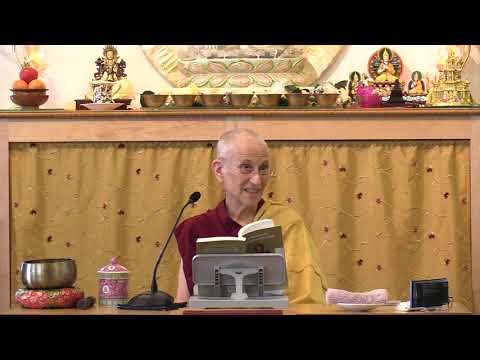Clusters of afflictions
25 Samsara, Nirvana, and Buddha Nature
Part of an ongoing series of teachings (retreat and Friday) based on the book Samsara, Nirvana, and Buddha Nature, the third volume in The Library of Wisdom and Compassion series by His Holiness the Dalai Lama and Venerable Thubten Chodron.
- How an affliction triggers another affliction
- Afflictions derived from ignorance
- Lack of faith, forgetfulness, non-introspective awareness
- Not monitoring thoughts, speech, physical actions
- Afflictions derived from ignorance and attachment
- Pretension and deceit
- Fabricating a good quality or hiding our faults
- Afflictions arising out of ignorance, anger and attachment
- Lack of integrity, inconsideration for others, heedlessness, distraction
- Not avoiding harmful actions based on what we value or taking others into account
Samsara, Nirvana, and Buddha Nature 25: Clusters of Afflictions (download)
Contemplation points
- Bring to mind a circumstance where you lacked introspective awareness. Recognize the conditions in which it arose and what results this mental factor caused.
- Consider each of the two afflictions derived from attachment and ignorance (pretension and deceit). How is each related to attachment and anger? Observe your mind throughout the day and make examples of how you see each of these in your own mind. When does it arise? What afflictions are involved? What are steps to counteract them?
- Consider each of the afflictions derived from attachment, anger, and ignorance (lack of integrity, lack of consideration for others, heedlessness, and distraction). How is each related to attachment, anger, and ignorance? Make examples of how you have seen each of these in your own mind and in the world. What difficulties arise when we act under their influence?
- As Dharma practitioners we have a certain responsibility towards sustaining the Dharma. How much are you aware in your daily life that your actions may have an effect on others’ trust in the Dharma?
- How can you purify past actions of heedlessness, for instance such as from times when you were a young adult and may have acted under its influence? How would you encourage a young person to counteract such an attitude?
Venerable Thubten Chodron
Venerable Chodron emphasizes the practical application of Buddha’s teachings in our daily lives and is especially skilled at explaining them in ways easily understood and practiced by Westerners. She is well known for her warm, humorous, and lucid teachings. She was ordained as a Buddhist nun in 1977 by Kyabje Ling Rinpoche in Dharamsala, India, and in 1986 she received bhikshuni (full) ordination in Taiwan. Read her full bio.


